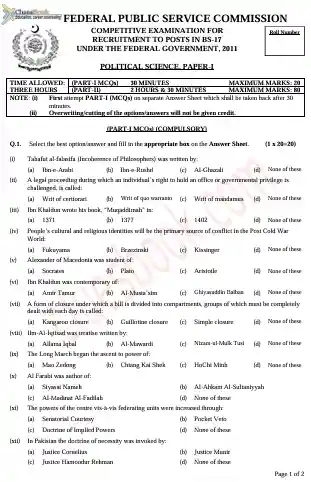2011 Past Paper Political Science CSS
Download 2011 Past Paper Political Science CSS. Explore a moderately detailed breakdown of CSS Political Science 2011. Understand its structure, core themes, and preparation strategies to align your study plan with exam expectations.

The Political Science paper of CSS 2011 tested candidates on both foundational political theories and contemporary global and regional issues. The paper was divided into two parts: Objective (MCQs) and Subjective (essay and descriptive questions).
Paper Format at a Glance
- Total Marks: 100
- Duration: 3 hours
- Sections:
- Part I – Objective (MCQs): 20 marks
- Part II – Subjective Questions: 80 marks
The paper aimed to assess both factual knowledge and the analytical ability of candidates.
Major Themes Covered
Western Political Thought
- Questions focused on the classical works of Plato and Aristotle.
- Topics included Plato’s ideal state and Aristotle’s views on constitutions.
Islamic Political Philosophy
- Examined the contributions of Al Farabi and Al Mawardi.
- Discussions centered around Islamic governance and the concept of the Imamate.
Core Political Concepts
- Definitions and applications of terms like sovereignty, liberty, law, and rights.
- Students were expected to explain the significance of their role in political systems.
Comparative Politics
- Focus on structural and functional comparisons:
- Presidential vs Parliamentary systems
- Federal vs Unitary governments
About the CSS
The CSS (Central Superior Services) Competitive Examination is a rigorous federal level test administered by the Federal Public Service Commission (FPSC) to select candidates for prestigious civil service roles across Pakistan. The exam’s rules and regulations, covering age limits, eligibility, subjects, and quotas, are detailed in the official CSS Rules section on the FPSC’s website.
The CSS Exam Rules, issued by FPSC Pakistan, outline eligibility criteria, age limits (21–30 years), and a maximum of three attempts for candidates. The exam includes written tests, a medical exam, a psychological assessment, and an interview. Rules also define quotas, disqualification grounds, and subject selection for a fair recruitment process.
Common Question Styles
- Analytical and discussion based
- Comparison and contrast
- Concept explanation with examples
- Application of theory to real-world politics
How to Approach 2011 Past Paper Political Science CSS
Build Strong Theoretical Foundations
- Focus on original texts and ideas from both Western and Islamic scholars.
Practice Comparative Essays
- Prepare outlines to compare political systems, ideologies, and concepts efficiently.
Connect Theory with Current Affairs
- Use examples from international politics to illustrate theoretical points.
Write Clearly and Logically
- Stick to a structured format: Introduction, Main Body, and Conclusion.
Recommended Study Topics
- Political thinkers (Plato, Aristotle, Al-Farabi, Al-Mawardi)
- Concepts: Sovereignty, Rights, Liberty, Justice
- Ideologies: Socialism, Communism, Liberalism
- Systems: Parliamentary vs Presidential, Federal vs Unitary
- Organizations: UN, WTO, and the effects of globalization
Your Next Step
The 2011 Past Paper Political Science CSS serves as a useful reference for understanding the examiner’s expectations, depth in theory, clarity in concepts, and relevance to modern political realities. As you prepare, focus on refining your analytical skills, linking ideas across thinkers and systems, and practicing structured answers. Download the 2011 Past Paper Political Science CSS now by clicking the download button in this article below.
Use this paper as a roadmap to shape your study routine, revise smartly, and approach the subject with both academic depth and strategic insight.

